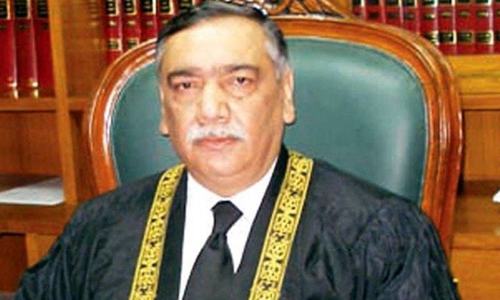
ISLAMABAD: A full-court meeting of all judges of the Supreme Court on Wednesday resolved to form special benches to deal with cases of different categories.
Presided over by Chief Justice Asif Saeed Khosa, the special meeting lasting almost six hours at the Supreme Court of Pakistan, also decided to discourage adjournment of cases and fix appeals in chronological order and fix reviews against court judgements within a week subject to availability of author judges.
At the first meeting after the elevation of Justice Khosa as the chief justice, the full court also discussed video link connectivity issue between the principal seat of the Supreme Court of Pakistan and its branch registries.
In his speech at a reference on Jan 17 to bid farewell to the outgoing Chief Justice Mian Saqib Nisar, the incumbent chief justice had hinted at introducing modern technology by taking advantage of video links to discourage adjournments trend and to ensure speedy dispensation of justice to the masses.
Full-court meeting of SC judges also decides to discourage adjournment of cases
The meeting also resolved that e-court system would be set up at the principal seat in Islamabad and its branch registries through application of the latest video link facilities within the minimum possible time to help lawyers argue their cases from branch registries by availing the facility.
The meeting observed that this facility would help minimise backlog of cases at branch registries.
At the beginning of the meeting, all judges congratulated the chief justice on his elevation to the highest judicial office.
The chief justice thanked the judges and expected healthy working relationship from judges for the cause of dispensation of justice.
Justice Khosa also apprised participants that the purpose of the meeting was to review the performance of the Supreme Court in terms of dispensation of justice and disposal of cases and to deliberate on issues and matters pertaining to smooth functioning of the court.
Deliberating on the issue of institution and disposal of cases in the Supreme Court, the full court noted that during the period from Sept 1, 2018, to Dec 31, 2018, the court decided 6,342 cases, leaving a total pendency of 40,535 cases.
The full court, however, showed satisfaction over institution and disposal rate and discussed different strategies, ways and means to bring improvements to case management for effective and smooth functioning of the court.
The meeting also underlined the need for categorising cases to cut the backlog of cases and to make efforts to improve dispensation of justice.
In the end, the chief justice thanked the judges and appreciated their commitment for the cause of dispensation of justice to the public at large so as to redress their grievances and to provide them immediate relief.
The meeting also discussed different administrative and judicial issues relating to internal working of the court.
Published in Dawn, February 7th, 2019














































